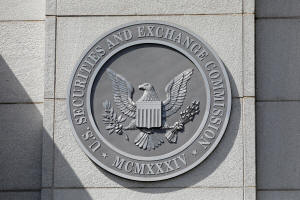|
The
reforms, which will aim to expand the use of centralized
clearing, according to a notice the SEC published last week,
follow snafus in the market in recent years which have raised
concerns about its ability to function during times of stress.
Most notably, Treasury market liquidity all but evaporated in
March 2020 as COVID-19 pandemic fears gripped investors,
prompting the Federal Reserve to prop up the market. Traders say
they continue to see liquidity problems with some securities,
Reuters reported last month.
Since 2020, the SEC and other U.S. regulators have been
exploring reforms to boost the market's resilience. The SEC's
five commissioners are scheduled to vote on its proposed changes
during an open meeting at around 10 a.m. EDT (1400 GMT) on
Wednesday.
The SEC notice said the agency would consider amendments to
certain clearing rules for Treasury market participants, without
providing details. Central clearing involves sending trades to a
clearing house, which requires both counterparties put up cash
to guarantee the trade's execution in the event either defaults.
Overall, just 13% of Treasury cash transactions are centrally
cleared, according to estimates in a 2021 Treasury Department
report.
SEC Chair Gary Gensler has advocated expanding centralized
clearing of Treasuries on the basis that the process increases
resilience by bringing additional capital into the market during
times of stress.
(Reporting by Michelle Price; editing by Jonathan Oatis)
[© 2022 Thomson Reuters. All rights
reserved.]
This material may not be published,
broadcast, rewritten or redistributed.
Thompson Reuters is solely responsible for this content.

|
|





